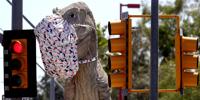PHOENIX — Under pressure from a court order, Gov. Doug Ducey agreed Monday to provide a “road map” to eventually allow not just gyms and fitness centers to reopen but also movie theaters, water parks and some bars.
In Southern Arizona, Cochise and Pima counties are both close to meeting the metrics for such reopenings, the state’s health director says.
Under the plan, gyms and fitness centers could reopen at 25% capacity when the number of people testing positive for COVID-19 in a county drops below 10% of all tests for at least two weeks in a row.
It also requires the rate of infection to be less than 100 cases per 100,000 residents and that fewer than 10% of those showing up at hospitals have COVID-like symptoms.
At that same point, movie theaters, water parks and river tubing operations could operate at 50%.
Any establishment licensed as a bar also could operate at 50% capacity, but only if it agrees to certain conditions. It would have to be operated like a restaurant, meaning no dancing, no milling around and mixing, and a requirement that hosts seat the patrons.
Gyms and fitness centers could get back to half capacity when fewer than 5% of tests come back positive, the number of cases drops below 10 per 100,000, and fewer than 5% of hospital visits are COVID-related.
And once the rate of positive tests drops below 3%, all businesses that have been restricted can reopen and operate the way they were before the pandemic — except bars and nightclubs. Forget about going back to those for the time being — and possibly through at least the end of the year.
Bars and nightclubs won’t be able to open their doors to customers until the percentage of residents testing positive for the virus drops below 3% for two weeks in a row. By comparison, the most recent figure statewide is 12.5%.
Even when a county hits the 3% figure — the point at which other businesses will be allowed to operate at full capacity — the system set up by state health director Dr. Cara Christ would keep bars and nightclubs at 50% capacity. She said the special treatment is merited.
“We know that these are high risk for transmission,” Christ said.
Asked when they would be allowed to return to normal operations and full capacity, she answered: “When a therapeutic (treatment) or a vaccine is established, then we would reconsider that. We know that getting to zero is probably impossible with COVID-19 until we get a vaccine.”
In essence, what was announced Monday sets up a dual process for facilities that have been shuttered until now.
One is the checklist of sorts, similar to what was announced last week to determine when it is safe to reopen schools. It includes the three-part test of positive test results, hospital visitations, and a two-week downward trend in new cases.
Christ said these “metrics” will be determined on a county-by-county basis.
She said Monday that it appears Yavapai County already has reached that point. Cochise and Coconino counties may be close.
Everywhere else, Christ said, will be determined with data posted each week.
Pima County, she said, is “really close.” Maricopa County, not so much.
Even when the infection rates hit the targets, though, that won’t allow businesses to automatically reopen. Owners first will need to attest that they are willing to abide by certain guidelines, ranging from occupancy and masking to certain cleaning requirements and physical distancing.
The other is what amounts to an alternate path for businesses that are located in counties where conditions have not yet reached the point that they can begin the process of reopening. Those businesses could petition for a waiver, but with no guarantee one would be granted.
That follows an order last week by Maricopa County Superior Court Judge Timothy Thomason, who said gyms and fitness centers, shuttered by the governor on June 27, are entitled to “due process” to prove they should be allowed to open — even if state health officials conclude that local conditions do not warrant it.
Under the waiver alternative, Christ said, owners could try to make the case that their own plans for safe operation mean they would not endanger public health. So, for example, she said they might agree to operate at an even more reduced capacity, or might have regular testing of employees.
The question remains whether the plan announced Monday complies with the judge’s order.
Attorney Joel Sannes, who represents Mountainside Fitness — and who got Thomason to order that gyms and fitness centers be provided with due process — said late Monday he was still studying the plan.
But Sannes noted that Christ said it could take up to 15 days for her department to issue a ruling on a waiver. And then, if the business was not satisfied, it would have to take the case to the Office of Administrative Hearings and, eventually, to court.
That, he said, may not provide businesses with true due process.
Thomason, in his ruling, did give wide berth to the decisions being made by Ducey and Christ.
“It is not the function of the judiciary to second-guess policy decisions on matters of public safety,” the judge wrote. But he said it is his role to ensure that the constitutional rights of business owners are protected.
“The injuries to these businesses have to be staggering,” Thomason wrote.
“The order only gives the gyms a chance to apply for reopening,” he continued. “It does not order that any fitness center be opened or that anyone be immediately put back to work.”
Businesses were involved in coming up with the standards announced Monday, said Daniel Scarpinato, the governor’s chief of staff. He called it a “data-driven approach.”
“We do want our businesses to open back up when it’s safe,” he said. “We think the best way to do that is to take a cautious approach.”
The fashion accessory of the summer is certainly cloth facemask coverings especially since many places, businesses, and states require it due to COVID-19. Buzz60’s Mercer Morrison has the story.
Photos: In Tucson, face masks are for more than just people
Face masks on objects
Updated
A Jeep sports with eyes like those from the movie "Cars" sports a COVID19 mask outside Alpha Graphics near the corner of Tanque Verde and Kolb, Tucson, Ariz., July 3, 2020.
Face masks on objects
Updated
The large Tiki head at the entrance of The Hut, 305 N. 4th Ave., wears a mask in response to the Coronavirus Disease (COVID-19) in Tucson, Ariz., on April 5, 2020.
Face masks on objects
Updated
The noted bull testicles on the statue outside Casa Molina at Speedway and Wilmot, usually painted in various schemes and wild colors, are in these CONVID19 times now sporting a face mask, March 27, 2020, Tucson, Ariz.
Face masks on objects
Updated
A dinosaur statue over the doors of MATS Dojo at 5929 E. 22nd St., sports an athletic cup for a face mask in the second week of COVID-19 restrictions, March 31, 2020, Tucson, Ariz.
Face masks on objects
Updated
The venerable T-Rex outside the McDonald's at Grant and Tanque Verde comes around late, but strong, to the mask game, May 13, 2020, Tucson, Ariz.
Face masks on objects
Updated
The iconic Casa Molina bull and matador statue both sported masks on the first full week of the loosening of COVID-19 restrictions in mid-May.
Face masks on objects
Updated
Father Kino's horse practice safe social interaction by wearing a mask even if Father Kino himself isn't. The statue sits at Cherry Fields at 15th Street and Kino Boulevard, Saturday, May 2, 2020, Tucson, Ariz.





